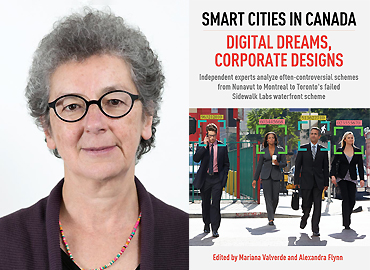In Iqaluit, Edmonton, Guelph, Montreal, Toronto and other cities and towns across Canada, residents, governments and corporations are navigating the promising and perilous landscape of “smart cities.”
Smart cities integrate hardware, software, cameras and sensing technologies into infrastructure enabling the collection of vast amounts of data which can then be used to optimize energy use, garbage collection and other services. The data can also be used to enable informed urban-planning decision-making.
Smart Cities: Digital Dreams, Corporate Designs examines these digital communities and the issues they raise around urban planning, corporate involvement and privacy.

Mariana Valverde is a co-editor of the book, along with Alexandra Flynn, an assistant professor in law from the University of British Columbia. Valverde is a professor emerita in the Faculty of Arts & Science’s Centre for Criminology & Sociolegal Studies, with cross appointments to the Department of Geography & Planning and the Faculty of Law.
Valverde, her co-editor and other experts will be taking part in a live, online discussion about smart cities organized by the Faculty of Arts & Science’s Centre for Ethics on Friday, January 29.
Arts & Science News spoke with Valverde before the event.
What is a typical beneficial innovation found in smart cities?
It’s very common for cities nowadays to purchase technology that will help to moderate traffic flow. So, you can have a camera on a traffic light and the camera can send information back to some data centre. And the system lets you alter the timing of the traffic lights depending on the time of day so that traffic flows more efficiently.
It’s easy to see why city officials would be interested in an innovation like that. It can be very helpful to residents. However, the challenge is that there are many different things — not just traffic flow — that make a city more efficient, sustainable and livable.
How should a city decide what those innovations will be? Who decides what’s most important?
These are key questions. What kind of needs assessment takes place? Who starts the process? And who controls the process? When cities don't prioritize what they want or what their needs are, there’s the danger of a company coming in and selling technology to them which can then result in the city being dependent on a private company and the city’s needs not being met.
Are there initiatives in Canada that can serve as an example of how to do it right?
When Montreal initiated their smart city challenge, it started with a democratic discussion about priorities. They asked people: What are the most important needs that must be met? And one of the things they heard was that food security wasn’t equal everywhere in the city. In some neighbourhoods, there’s a great selection of food that’s readily available. But there are also many neighbourhoods that are “food deserts” that lack access to fresh food. And so, having understood that food was a priority, Montreal came up with a system that helped identify food deserts. And with a fleet of smart vehicles — though not driverless — they could better distribute fresh food from nearby farms to specific neighbourhoods. So the innovation solved a problem that citizens themselves identified. And it was done in a way that there are no surveillance or privacy issues.
So surveillance and privacy are important issues?
For sure, and we have a couple of chapters in our book that deal with that. There can be all sorts of data and surveillance problems. But it’s worth pointing out that they're not significantly different from the datamining and surveillance problems that come with simply owning a smart phone.
Yes, there are dangers — especially when cities don't own the data and don't control it. And in the vast majority of cases, data isn't even stored in Canada. But that too, isn’t a problem specific to smart cities.
What else should we be thinking about when we think about smart cities?
In the introduction to the book, we point out that as a northern country, Canada should be leading the way in providing broadband access everywhere before putting resources into technology for small areas of highly urbanized and privileged parts of the country. In fact, my co-editor Alexandra Flynn — who is a lawyer who grew up in Nunavut and is an expert on Indigenous rights — says in her chapter that broadband access could be considered as a federal duty under the agreement that created Nunavut.
Paying attention to northern and Indigenous communities should be a priority. And we think that's a contribution that Canada can make to the global discussion on smart cities — a more democratic conversation about prioritizing infrastructure needs and infrastructure projects.
Right now, Canada is making a point of providing the COVID-19 vaccine to Indigenous and northern communities. If we can do that for the vaccine, maybe we can do that for basic internet access which is a vital, much longer-term need.
Register Now:
Smart Cities in Canada: Digital Dreams, Corporate Designs
Friday, January 29, 2021 | 3 – 5 pm EST

